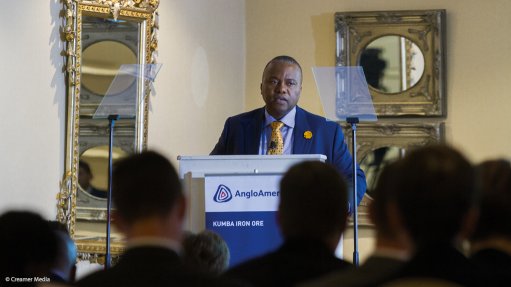
Kumba Iron Ore CE Themba Mkhwanazi
Photo by: Creamer Media
JOHANNESBURG (miningweekly.com) – Iron-ore mining and marketing company Kumba Iron Ore on Tuesday reported a resilient financial performance despite logistics and export market conditions that resulted in 24% earnings fall to R7-billion compared with the first six months of last year.
Attributable free cash flow of R2.8-billion and a strong opening cash position translated into an interim cash dividend of R4.7-billion, despite the impact of a stronger rand and softer iron-ore prices.
Total revenue decreased by 9% to R19.5-billion with the average realised iron-ore export price decreasing 3% to $69/t.
Net cash of the company, headed by CE Themba Mkhwanazi, is down from R13.9-billion on a cash dividend payment of R6.3-billion and capital expenditure of R1.4-billion on deferred stripping and expansion, including at the Dingleton residential township.
In the six months to June 30, the Anglo American group company reported a 14% gain from higher sales premiums and cost savings, which helped to offset the impact of a 7%-stronger rand, 3% lower export prices and higher inflation-related costs.
A net freight loss on shipping operations cut the earnings margin to 36% from 43% last year.
While controllable costs were held at $1/t, non-controllable costs rose $5/t on an average cash break-even iron-ore price of $46/t, which was up by $6/t on last year.
The lower earnings before interest, taxes, depreciation and amortisation resulted in operational cash flow generated from operations decreasing to R6.9-billion (1H17: R11.7-billion).
Shareholder returns are being prioritised through the JSE-listed company’s new dividend payout policy of 50% to 75% of headline earnings while growth investment continues.
The company described the rail performance of the State-owned Transnet as being “sub-optimal”, with six derailments since the second half of 2017.
As a result, iron-ore railed to the Port of Saldanha remained similar to the comparative period at 20.8-million tonnes. The derailed wagons have been replaced and performance is being monitored closely to secure delivery of contractual capacity. Initiatives have been implemented to mitigate the impact of derailments, which include reducing loading times and improving our turnaround times at the mines, Kumba said in a release to Creamer Media’s Mining Weekly Online.